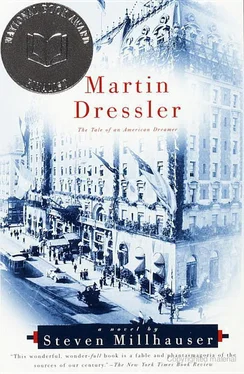Martin nodded stiffly and strode back into his apartment, shutting the door hard behind him. He hung his coat on a peg of the hall tree, then turned out the lamp in the parlor and made his way through the dark, till passing through a door he found himself suddenly surrounded by dim dolls in glass cases. He groped his way back into the parlor and made his way to another door, and stepping through he saw again the glimmering glass cases, the shadowy sad dolls, and stumbling away he passed through another dark room, and again it seemed to him that he was passing through many rooms, through all the rooms of the city, in order to reach his wife. After a while he came to a door, a door that was partly open, as if he had already come through it the other way. He pushed at it uncertainly. Caroline was sitting up in bed, in the dark. “Mother spoke to me,” she said.
Martin wondered what the devil Mrs. Vernon had told her. He went over to the bed and lay down, and as he did so a heavy weight seemed to roll through his skull and press against the top of his head. He felt something soft and dry and cool on his forehead, and for a moment he was startled, almost frightened: what could it be? Then he realized that it was Caroline’s hand. He raised a hand and patted the back of her hand.
“Everything’s going to be all right, Caroline.” The words soothed him, an immense, crushing peace came over him, in the dark he patted her hand again, and at once he began dreaming: he was sitting on a sunny-and-shady bench beside his mother, she was wearing a hat with black ostrich feathers, and beyond the edges of the hat, which seemed far above his head, he could see tall buildings against the brilliant blue sky.
20. The Fate of the Vanderlyn
FOR THE CHRISTMAS SEASON MARTIN DIRECTED his managers to trim their windows with holly wreaths and cotton snow. They were to make room inside for a Christmas tree trimmed with colored glass balls and clearly visible from the street. He instructed each female employee to wear green and red ribbons in her hair and each male employee to wear a green and red silk flower in his buttonhole. Special Christmas napkins were to be used, beginning on the first of December, and each table was to have a red or green wax candle. Free red and green candy suckers, wrapped in red and green waxed paper twisted at the ends, were to sit in baskets beside each cash register. Martin had found a small candy shop and manufactory on Broome Street willing to supply his cafes with hard candy at the low price of twenty cents a pound, if he ordered one hundred pounds, and he instructed the managers to divide the remaining candy evenly among all employees on the day after Christmas.
Holiday profits from the five Metropolitans were so high that Martin immediately began to lay plans for another cafe in Brooklyn; and in the new year he received from the owner of a big department store an offer to purchase his chain of cafes for a remarkable sum.
His life outside the business had returned to its accustomed round. In the morning Martin rose early, long before Caroline, and took breakfast with Emmeline at a corner table in the restaurant of the Bellingham. In the evening he returned to the hotel at eight or nine to find Caroline and Emmeline and Margaret sitting in the lamplit parlor. For nothing had changed, nothing would ever change, throughout eternity he would step from the lobby into the lamplit parlor where three women sat waiting, while somewhere in another life a marriage took place: her hand in her sunny lap, the carriage creaking, fresh flowers in his mother’s hat. And approaching the women Martin would bend over Caroline and kiss her lightly on her uplifted cheek, while a carriage full of sunlight disappeared into the long afternoon, and sinking into his armchair he felt himself sinking down into deep cool subterranean vaults. There he found himself talking with Emmeline and Margaret, while Caroline sat with half-closed eyes. After a while Emmeline would rise, explaining that she had to get up early, urging the others to stay. And at once Margaret would rise, and slowly Caroline would rise, and then Martin himself would rise, out of the cool vaults into steamheated lamplit air. Together all four would walk to the elevators, together they would ride to the fifth floor. And two by two they would walk down the corridor, two by two they would turn left, and at their doors they would pause and say good night, two by two.
Caroline was tired, always tired. She had begun to complain of pains in her back; and although in the days after their wedding night she had obediently performed her nightly duty, Martin had taken to slipping less and less often over to her side of the bed, for she seemed to take no pleasure in his attentions, lying motionless and silent beneath him, and turning abruptly onto her side, without a word, as soon as he was through.
Sometimes, when she was fully clothed, Caroline would fall into a playful affection. She would ruffle his hair, and rub his shoulder, and give him little hugs, and call him her little pet; and sometimes she would sit on his lap. In these moods she would allow him to hug her and stroke her hair, but at the first sign of desire she would stand up quickly, with an odd, disturbed look, as if he had spoiled something, as if he had failed to understand.
She complained of a heaviness, a tiredness, of pains in her legs, of a sensation of pressure in her temples, of headaches branching out like pictures of lightning in chromos of storms, of flutters in her eyelids, of a vague malaise, as if something were not right, not really right at all; and stretching out on the blue-green damask sofa in her mother’s parlor, beneath a heavy comforter, with one arm thrown over her eyes, she would lie for hours in the dusk of long winter afternoons.
One morning when Martin stepped out of the apartment he saw Marie Haskova with her mop and bucket, walking slowly and heavily down the hall. Even as his muscles tightened he realized that it was the fifth-floor maid, a heavyset fiftyish woman with thick hams and very pale smooth skin, who put him in mind of a stern nun. It occurred to him that just above his head Marie Haskova was making her rounds, confined forever to her floor as if she had disappeared into the forests of Bohemia. Secretly she moved through the building by service elevator, silently she took her meals in the basement, unseen she lay down in her attic bed — a ghost of the Bellingham, fluttering in the dark, ungraspable.
Often at night Martin lay thinking of Marie Haskova in her ghostly attic chamber, of Louise Hamilton in her dusky parlor, of Dora and Gerda in the house with rattling windows, of the actresses in the hallway, of women in long dresses, of women who smiled at him in lobbies and elevators, who looked at him in a certain way. Then it seemed to him that he was surrounded by swarms of floating whispering women who brushed against him and bent over him, offering their breasts and tongues, while only Caroline, with her pale hair pulled back tight, stood with her face turned a little to one side, staring dreamily at something in the distance.
To his surprise he felt no anger at Caroline, whose remoteness seemed as fixed and unalterable as the paleness of her hair or the half-closing of her dark, unseeing eyes. He felt that he ought instead to be angry at Caroline’s mother, for hadn’t Margaret Vernon brought up her daughter in utter ignorance of everything, hadn’t she watched over and in a sense encouraged her illnesses, her weariness, her unawakened existence, her dream-in-life? Yet he wasn’t angry at Margaret Vernon either. Rather he had fallen into a kind of lassitude, in relation to Caroline, a slumber almost like that of Caroline herself. There were times when he marveled at the strength of her languor, which lapped against him in slow warm waves, soothing away his desire, filling him with a sweet, melting melancholy, a dissolving shadowy sweetness of vague regret and dim longing.
Читать дальше












